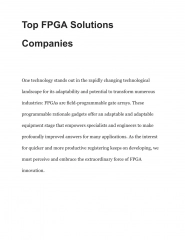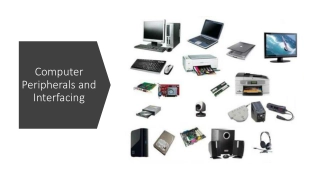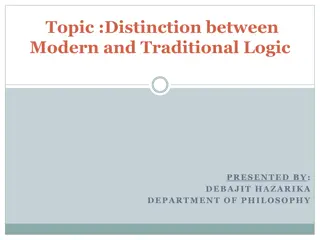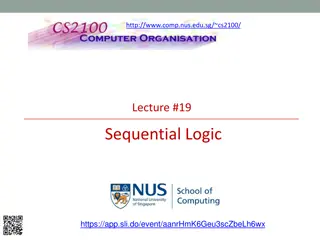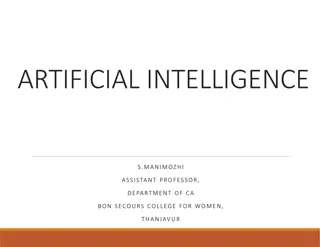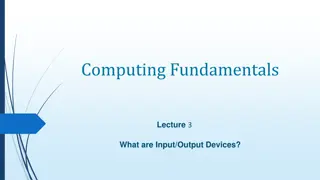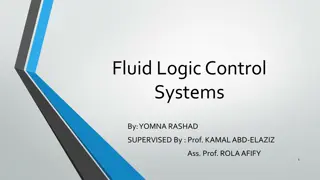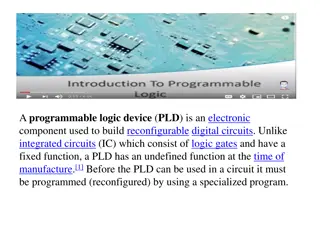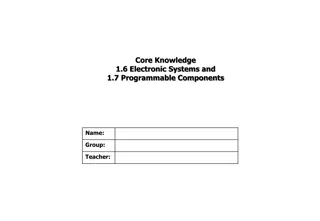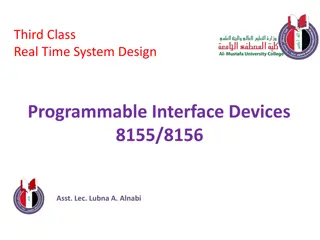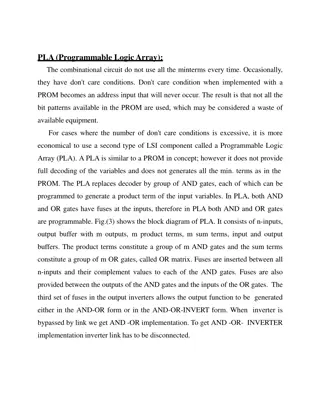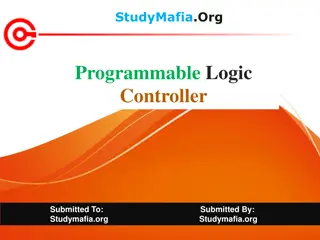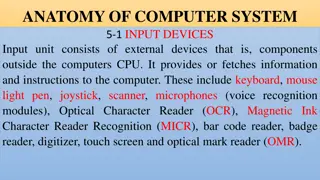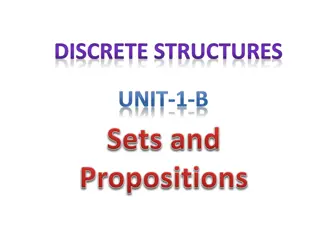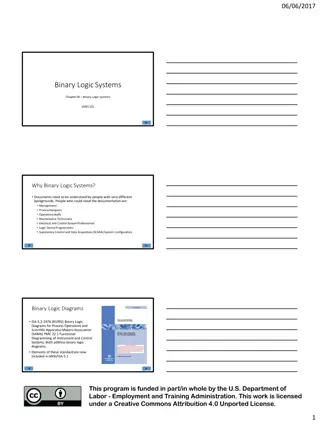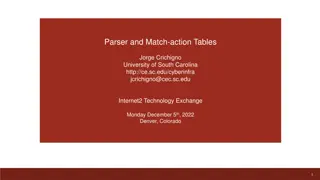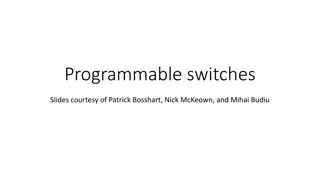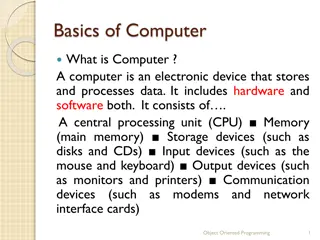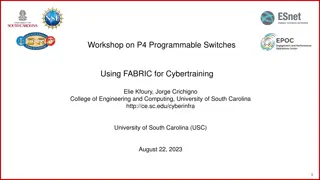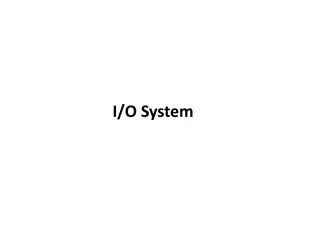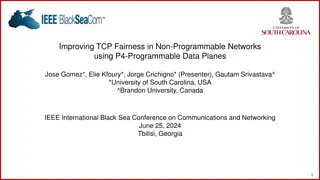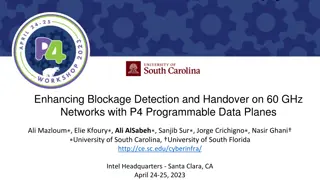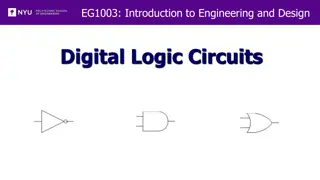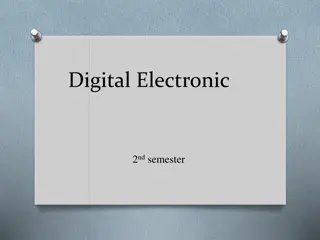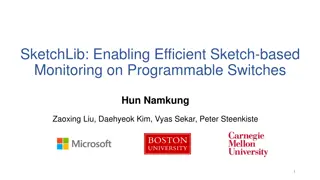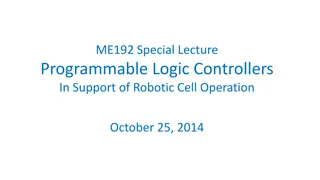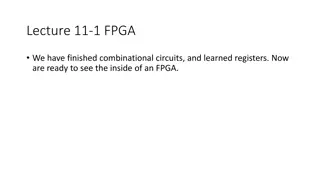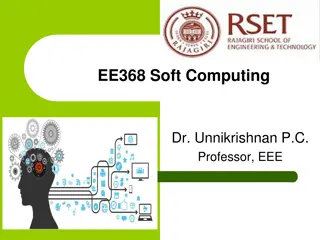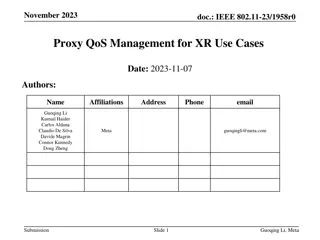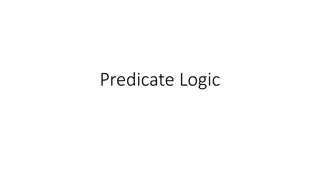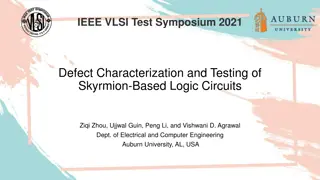Top FPGA Solutions Companies
In the rapidly evolving technological landscape, one technology stands out for its versatility and potential to revolutionize various industries: Field-Programmable Gate Arrays (FPGAs). These programmable logic devices offer a flexible and customizable hardware platform that enables engineers and de
1 views • 1 slides
Computer Peripherals and Interfacing
Computer peripherals are external devices that enhance the functionality of a computer. They include input devices like keyboards and mice, output devices like printers and monitors, and storage devices like hard disk drives and solid-state drives. Interfacing circuits connect these peripherals to t
1 views • 6 slides
Topic : Distinction between Modern and Traditional Logic.
Logic, as a normative study, focuses on distinguishing correct reasoning from incorrect. Traditional logic, based on Aristotle's work, emphasized syllogistic reasoning, while modern logic, pioneered by figures like Leibnitz and Russell, employs mathematical methods and symbolic logic for a more adva
2 views • 10 slides
Logic Families
Logic families such as Diode Logic (DL), Resistor-Transistor Logic (RTL), and Diode-Transistor Logic (DTL) each have distinct capabilities and limitations when it comes to performing logic functions. While DL gates are simple and inexpensive but limited in functionality, RTL gates offer both normal
1 views • 22 slides
Understanding Sequential Logic in NUS CS2100 Lecture #19
Explore the concepts of sequential logic in Lecture #19 by Aaron Tan at NUS, covering memory elements, latches, flip-flops, asynchronous inputs, synchronous sequential circuits, and different types of sequential circuits. Delve into the distinction between combinatorial and sequential circuits, memo
3 views • 26 slides
Understanding Predicate Logic in Artificial Intelligence
In the world of artificial intelligence, predicate logic plays a crucial role in representing simple facts. It involves syntax, semantics, and inference procedures to determine the truth value of statements. Real-world facts are represented using propositions in logic, allowing for structured knowle
1 views • 19 slides
Understanding Input and Output Devices in Computing
In computing, input and output devices play a crucial role in enabling communication between users and computers. Input devices are used to enter data into a computer, while output devices display or provide the results of processed information. Common input devices include keyboards, mice, and joys
0 views • 17 slides
Introduction to Fluid Logic Control Systems
Fluid logic control systems utilize devices that switch fluid, like air, between outlets, providing ON/OFF outputs swiftly based on control signals. This article explores moving-part logic devices, control functions, Boolean algebra applications in control technology, and advantages of fluid logic s
1 views • 22 slides
Understanding Logic Circuits in Aircraft Systems
Aircraft logic systems follow MIL/ANSI standard logic symbols and conventions used in electronic applications. Inverters, buffers, AND gates, OR gates, NAND gates, NOR gates, Exclusive-OR gates, and Exclusive-NOR gates are commonly used in aircraft logic circuits. These gates have specific behaviors
0 views • 52 slides
Understanding Programmable Logic Devices (PLD) in Digital Electronics
Programmable Logic Devices (PLDs) are versatile electronic components used to create reconfigurable digital circuits, distinct from fixed-function integrated circuits. PLDs require programming before use, enabling customization for specific functions. This article explores PLDs, digital electronic s
0 views • 10 slides
Understanding Electronic Systems and Programmable Components
Dive into the world of electronic systems and programmable components by exploring key terms, sensors like Light Dependent Resistor and Thermistor, control devices, circuit components, and flow charts. Learn about inputs, outputs, feedback loops, and how to design simple routines for controlling out
1 views • 6 slides
Programmable Interface Devices 8155/8156 Overview and Design Considerations
Explore the capabilities of programmable interface devices 8155/8156 for interfacing I/O devices to microprocessors. Learn about their features, block diagrams, control signals, and address determination. Discover how to design interfacing circuits for reading data from A/D converters using the 8155
0 views • 10 slides
Understanding Programmable Logic Arrays (PLA)
Programmable Logic Arrays (PLAs) provide a flexible way to implement combinational circuits with don't care conditions efficiently. PLAs use programmable AND and OR gates to generate product terms, offering a more economical solution compared to PROMs for circuits with excessive don't care condition
0 views • 19 slides
Understanding Programmable Logic Controllers (PLC)
Programmable Logic Controllers (PLCs) are tiny computers used to control system functions with programmed logic. They receive inputs and provide operating instructions to automate processes in various industries. PLCs have replaced manual relay-based systems and are essential in industrial control t
0 views • 24 slides
Workshop on Fine-grained Measurements App with P4 Programmable Switches
Explore the world of P4 programmable switches in a workshop hosted by the University of South Carolina. Learn about P4, programmable data plane switches, packet parsing, queue monitoring, and applications with P4 switches. Discover the shift from traditional networking to SDN, overcoming limitations
1 views • 19 slides
Overview of Computer Input and Output Devices
Input devices of a computer system consist of external components like keyboard, mouse, light pen, joystick, scanner, microphone, and more, that provide information and instructions to the computer. On the other hand, output devices transfer information from the computer's CPU to the user through de
0 views • 11 slides
Understanding Propositional Logic and Mathematical Logic in Computer Science
Study the development of formal logic in computer science, focusing on propositional logic and mathematical logic. Learn about propositions, logical operators, and ways of combining statements to derive conclusions. Explore examples and understand how to determine the validity of arguments using log
0 views • 38 slides
Understanding Binary Logic Systems in Documentation
Binary logic systems play a crucial role in documentation for individuals with diverse backgrounds such as management, process designers, operations staff, maintenance technicians, and more. These systems, depicted in binary logic diagrams, provide a clear and concise representation for various prof
4 views • 16 slides
Programmable Parser and Header Definitions at University of South Carolina
Programmable parsers and custom header definitions play a crucial role in network packet processing. This presentation by Jorge Crichigno at the University of South Carolina covers topics such as parser operation, predefined states, and header formats. The content delves into the capabilities of pro
1 views • 22 slides
Evolution of Programmable Switches and Routers
Explore the evolution of programmable switches and routers, from early attempts at programmability to the introduction of the P4 programming language and Software Defined Networking (SDN). Discover the shift towards greater customization and control in network infrastructure, leading to the developm
0 views • 40 slides
Understanding Basics of Computer Systems
A computer is an electronic device that stores and processes data using hardware and software components. It consists of a CPU, memory, storage devices, input/output devices, and communication devices. The CPU includes a Control Unit and Arithmetic Logic Unit, and the memory stores data in bytes. St
0 views • 57 slides
Introduction to Symbolic Logic: Understanding Logical Inferences
Logic is the study of reasoning methods to distinguish between correct and incorrect arguments. Symbolic Logic involves representing logic symbolically for easier understanding and manipulation. Logical inferences help in making decisions based on reasoning chains. The content discusses the use of l
1 views • 28 slides
Effective Fuzz Testing for Programmable Logic Controllers - Research for Nuclear Safety
This paper discusses the significance of fuzz testing for Programmable Logic Controllers (PLCs) to ensure nuclear safety, citing incidents like the Stuxnet worm attack. It delves into the methodology, zero-day vulnerability findings, and results of the research conducted by authors in February 2020,
1 views • 11 slides
UBU Performance Oversight Engagement Framework Overview
Providing an overview of the UBU Logic Model within the UBU Performance Oversight Engagement Framework, this session covers topics such as what a logic model is, best practice principles, getting started, components of the logic model, evidence & monitoring components, and next steps. The framework
0 views • 33 slides
Workshop on P4 Programmable Switches Using FABRIC for Cybertraining - University of South Carolina
Explore the world of P4 programmable switches and FABRIC infrastructure for cybertraining at the University of South Carolina. Discover the FABRIC testbed, cybertraining opportunities, organization of labs, and hands-on labs focusing on P4 programmable data planes over FABRIC. Enhance your knowledge
0 views • 13 slides
Understanding I/O Systems and Devices
I/O systems and devices play a crucial role in computer operations. They can be categorized into block devices and character devices based on their functionalities. Block devices store information in fixed-size blocks with addresses, while character devices handle character streams. Some devices, li
0 views • 19 slides
Enhancing TCP Fairness Using P4-Programmable Data Planes
This study presents a solution to improve TCP fairness in non-programmable networks by utilizing P4-programmable data planes. It addresses unfair bandwidth distribution issues in TCP traffic and proposes a system that leverages P4 switches for passive traffic monitoring and RTT computation.
0 views • 24 slides
Enhancing Blockage Detection and Handover on 60 GHz Networks with P4 Programmable Data Planes
The study presents a system using programmable switches to monitor packet inter-arrival time for blockage detection on mmWave networks. Results show fast recovery speeds and minimal impact on flow completion time, with contributions focusing on leveraging programmable switches and real device scenar
0 views • 7 slides
Broadband Access Points & Programmable Logic Controllers Replacement Phase 1 Project Overview
This project overview provides details of the Broadband Access Points & Programmable Logic Controllers Replacement Phase 1 Project led by Jeff Ray, EIT Project Engineer at Treatment & Recycle Engineering. It includes information on the pre-submittal conference, RFQ schedule, evaluation criteria, and
0 views • 13 slides
Understanding Digital Logic Circuits and Design Principles
Explore the world of digital logic circuits with a focus on logic gates, truth tables, boolean equations, and Karnaugh maps. Learn how to design combinational logic circuits, analyze different logic functions, and solve sample problems related to digital logic. Get hands-on experience with LabVIEW a
0 views • 28 slides
Introduction to Digital Electronic Circuits and Logic Gates
Understanding digital electronic circuits and logic gates is essential for building digital systems. This content covers the basics of logic gates, digital signals, and the practical application of binary digits in circuits. It discusses the function and importance of logic gates, such as NOT gates
0 views • 17 slides
Enhancing Efficiency in Sketch-based Monitoring for Programmable Switches
SketchLib introduces advancements in sketching algorithms to enable efficient monitoring on programmable switches. The tool bridges gaps between existing sketches for CPUs and programmable switches, offering resource optimizations and API calls to enhance performance and reduce resource consumption
0 views • 20 slides
Introduction to Logical Thinking: Science of Correct Reasoning
Logic, the science of correct reasoning, explores ways to infer conclusions from assumptions and validate arguments. This course introduces logic as a tool for analyzing arguments, automating processes, and enhancing communication clarity. Through classic logic variants like propositional and predic
0 views • 30 slides
Understanding Programmable Logic Controllers (PLCs) in Robotic Cell Operations
Programmable Logic Controllers (PLCs) are versatile devices used in various industries for automation and control processes. This article explores the functionality and applications of PLCs in supporting robotic cell operations, emphasizing their role in conveyor control, multi-robot workstations, a
0 views • 15 slides
Understanding the Inner Workings of FPGA and Complex Programming Logic Devices
Delve into the inner mechanisms of Field Programmable Gate Arrays (FPGA) and Complex Programming Logic Devices, examining components such as configurable logic blocks, lookup tables, function generators, multiplexers, and flip-flops. Explore the application of Shannon's Expansion Theorem in circuit
1 views • 10 slides
Applications of Fuzzy Logic in Soft Computing
Fuzzy logic is primarily used as the underlying logic system for decision support systems in various applications. From fuzzy controllers to fuzzy rule bases, this technology enables approximate reasoning similar to human decision-making processes. Explore the architecture and major components of Fu
0 views • 27 slides
Proxy QoS Management for XR Devices in IEEE 802.11-23/1958r0 - November 2023
This document discusses the challenges faced by XR devices in terms of size, thermal constraints, cost, and power limitations leading to the proposal of Proxy QoS Management to enhance Wi-Fi performance. The aim is to leverage TGbn devices for improving legacy devices' connectivity within a Wi-Fi ne
0 views • 6 slides
Understanding Predicate Logic and Quantifiers
Predicate logic extends propositional logic by allowing statements to be assigned specific values. The limitations of propositional logic are overcome through predicate logic, where statements like "?. is greater than 3" have subject and predicate parts denoted as ?(?). Furthermore, predicates can b
1 views • 20 slides
Understanding First-Order Logic Fundamentals
Explore the limitations of propositional logic and delve into the syntax, semantics, and inference rules of first-order logic. Learn about predicates, quantification, and how to express relationships among objects using predicates. Enhance your understanding of how first-order logic provides a more
0 views • 42 slides
Defect Characterization and Testing of Skyrmion-Based Logic Circuits at IEEE VLSI Test Symposium 2021
With CMOS devices nearing quantum-mechanical limits, magnetic skyrmions offer a promising solution for next-generation spintronic logic devices and memories. This presentation at the IEEE VLSI Test Symposium 2021 delves into defect characterization and testing of skyrmion-based logic circuits. It co
0 views • 19 slides
